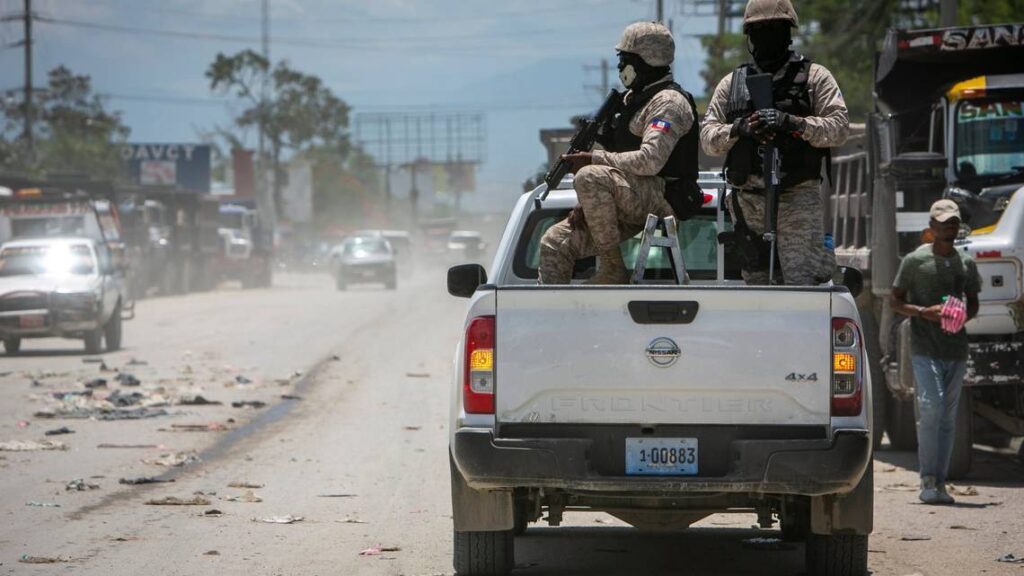PORT-AU-PRINCE — Civilian contractors have started to arrive in Haiti to help prepare for the arrival of Kenyan forces, whose deployment is currently in the works, a top Biden official confirmed to the Miami Herald on Friday.
Todd D. Robinson, the U.S. assistant secretary of state for the Bureau of International Narcotics and Law Enforcement Affairs, said an initial deployment of Kenyan police officers is being planned to coincide with the arrival of President William Ruto in Washington later this month.
The White House has confirmed that President Joe Biden and First Lady Jill Biden will host Ruto and his wife, First Lady Racheo Ruto, for a state visit on May 23 to mark the 60th anniversary of U.S.-Kenya diplomatic relations.
“The initial deployment will happen sometime around his State visit,” said Robinson, declining to give an exact date or the number of officers who will be deployed as part of the long-awaited Multinational Security Support mission.
On Friday, a day after U.S. helicopters were seen flying through Port-au-Prince’s dark skies, the U.S. Southern Command landed another aircraft at Toussaint Louverture International Airport. The plane transported civilian contractors who will be providing support to the Pentagon to build out the area where the Kenyan support mission is supposed to be staying while in Haiti.
The Pentagon, which has pledged $200 million to assist in the mission, is responsible for making a base ready for the forces. Congressional aides have said that requires 45 days. Officials with the Department of Defense declined to provide details on their housing plans.
The base’s construction, however, is crucial.
“We don’t want to send them into a situation where they’re not securely housed and have a place to sleep, plan and do all of that,” said Robinson.
Ruto first pledged 1,000 of his police officers in July 2023 to lead an international force to assist Haiti’s national police, pending his government’s security assessment and a mandate from the U.N. Security Council, which was given in October.
Since then, however, the initiative has faced one obstacle after another, from court challenges and judicial blocks in Nairobi to funding holds in Congress to the March 11 forced resignation of Haitian Prime Minister Ariel Henry amid a gang insurgency.
Though the court challenges appear to have been cleared, the initiative still lacks the proper funding.
Republican lawmakers in Congress have ignored a request by the State Department to release $40 million of the $100 million it has pledged to support the mission.
Aides to Rep. Michael McCaul of Texas and Sen. Jim Risch of Idaho have criticized the plan, while accusing the administration of not providing clear details about the force. Administration officials, meanwhile, have said they have provided more than 60 briefings and answered dozens of questions from GOP offices.
Amid the delay, thousands of Haitians have either lost their lives or been injured, and Haiti teeters on the brink of a humanitarian catastrophe as millions of people are unable to find enough food to eat. The U.N., which has joined the U.S. in calling for assistance for the multinational force and humanitarian response, has said that Kenyan-led mission need to be deployed quickly to assist the Haiti National Police take on ruthless gangs that continue to force people out of their homes and hold millions of people in Port-au-Prince hostage.
Robinson declined to go into details about the operations. But he conceded that the goal with the initial deployment is to begin to bring relief to Haitians — who this week endured a fresh round of attacks by armed gangs — and to convince U.S. lawmakers and donors to provide the necessary funding.
“We’re doing the best we can within our constraints and our authorities,” he said.
Robinson said while there is currently enough money to pay for Kenya’s personnel expenses and the initial deployment, more money is needed. The goal is to deploy the forces in phases.
“I don’t think personnel is going to be our problem. I think resources, financial resources are going to be our problem,” he conceded. “And we are on a daily basis, on an hourly basis, going out to our friends in the international community, asking them to step up.”
The U.S., he said, has seen a number of countries volunteer personnel. But the challenge is funding.
Earlier this week, the U.N. said a trust fund for the mission currently has only $18 million.
“The funds were provided by Canada, by France and the United States,” said Stéphane Dujarric, spokesperson for U.N. Secretary-General Antonio Guterres. Dujarric said that The Bahamas, Bangladesh, Barbados, Benin, Chad, Jamaica and Kenya have officially notified Guterres in writing, as requested by the U.N. Security Council, of their intent to contribute personnel to the mission.
In late February, while Henry was in Nairobi to sign the the necessary accords for the deployment of the Kenya forces, armed gangs in Port-au-Prince united and launched a broad assault on key government institutions while demanding his ouster.
Police stations, the airport and seaport were all targeted. Gangs also orchestrated the release of more than 4,000 inmates from the country’s two largest prisons. The attacks deepened concerns that the mission would be too dangerous for international forces and, with Henry forced to resign, Ruto’s government put the mission on hold.
He has since said his police are ready to deploy, welcoming the installment of a new transitional presidential council in Haiti, which will be tasked with readying the country for the mission.
“Our intention is to have the international community support the Haitian national police in doing their job, and also to allow them to get a rest,” he said. “These guys have been going for a long time at 110% and they’ve been getting the job done.”
Outgunned and outnumbered, Haiti police have struggled to push gangs back. In some cases, they’ve been unable to stop invasions of neighborhoods and the takeover of police stations as the gangs tightened their grip on Port-au-Prince and parts of the Artibonite Valley. In others, they’ve succeeded in fighting back attempts to take over the National Palace, the Central Bank and the international airport, which they’ve protected with help from members of the small Haitian Army.
Frantz Elbé, the director general of the Haiti National Police, said since the attacks began on February 29, his officers have not only fought back the gangs, they’ve also created a buffer zone around the airport. Elbé‘s own home was set ablaze by gangs during the mayhem.
“We’ve reinforced the security perimeter inside and outside of the airport,” he said. “The police have carried out a lot of operations that have allowed for improvements in the security at the airport. We’ve also demolished a lot of houses.”
The destruction of about 200 houses around the airport by the Haitian government, which has spent thousands of dolalrs compensating residents, has not only led to better visibility of the runway but also blocked gangs from being able to perch themselves on structures and shoot at the runways. The government has constructed security towers around the perimeter.
“This has already allowed for the landing of five U.S. flights that have transported cargo and personnel ,” Elbé said about the flights coordinated by U.S. Southern Command. “And there are other security measures being taken.”
Currently, he said, members of the army and the police are providing security for the airport. While police officers are outside, both soldiers and cops are inside.
Ultimately, Elbé said, the goal is to build the confidence needed for U.S. airlines to resume their commercial flights to Haiti, which have been suspended since March 4.
“The second phase of our strategy is to dismantle the gangs and create a space where the government can provide services to neighborhoods once occupied by gangs,” he said.
That is where the foreign forces, led by Kenya, will help, Elbé said. “They can help us in the operations that we are going to do to dismantle the gangs.”
The motivation of Haiti’s police officers isn’t lost on U.S. officials, who say they have shown that they can carry out complex and dangerous operations over the last two months.
“This is what the training that we’ve been doing has gotten us,” Robinson said. “There has not been a total collapse. They have been able to clear the airport and maintain the airport and no one thought they would be able to do this…. And we know how hard this has been.”
Robinson declined to go into details on how many Kenya officers would be initially deployed, and how they would carry out operations, saying only that the plan is to get Haitians to a place where the country, which last held general elections in 2016, can head to the ballot box.
“The idea for this is to get them to elections. The [police] and their collaboration with the Haitian army has shown that when push comes to shove, when they have to get something done, they can get it done,” Robinson said. “We think with the introduction of this international force, we will be able to get them to elections. That’s what success looks like. Are there other things we have to do after that? Yes. But if we can get them to elections, that’s a strong start.”
By JACQUELINE CHARLES/Miami Herald



